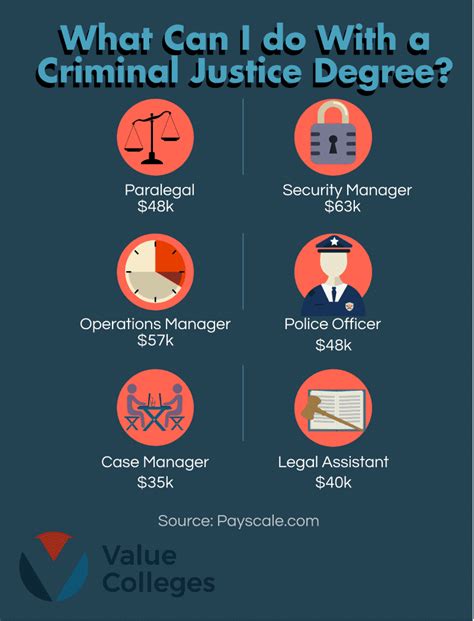Introduction:

The criminal justice field encompasses various aspects of law enforcement, corrections, and the justice system. With a criminal justice degree, you can pursue a wide range of careers that offer rewarding experiences and opportunities to make a positive impact on society. This article will explore the diverse career options available to individuals who hold a criminal justice degree.
Law Enforcement and Investigations
1. Police Officer:
Police officers are responsible for upholding the law, maintaining public safety, and investigating crimes. They perform duties such as patrolling neighborhoods, responding to emergencies, and apprehending suspects. According to the Bureau of Labor Statistics (BLS), the median annual salary for police officers was $67,290 in May 2021.
2. Detective:
Detectives investigate complex crimes, gather evidence, and interview witnesses. They analyze crime scenes and prepare reports to assist in solving cases. The BLS reports that the median annual salary for detectives was $88,680 in May 2021.
3. Crime Scene Investigator (CSI):
CSIs specialize in collecting, analyzing, and preserving evidence at crime scenes. They work closely with law enforcement to identify suspects and link them to crimes. The median annual salary for CSIs was $63,720 in May 2021, according to the BLS.
Corrections and Rehabilitation
4. Correctional Officer:
Correctional officers supervise and manage inmates in prisons, jails, and other correctional facilities. They maintain order, ensure safety, and provide rehabilitation programs. The BLS reports that the median annual salary for correctional officers was $50,460 in May 2021.
5. Probation and Parole Officer:
These professionals help offenders reintegrate into society after serving their sentences. They supervise and provide guidance to individuals on probation or parole, helping them navigate the challenges of re-entry. The median annual salary for probation and parole officers was $61,790 in May 2021, according to the BLS.
6. Social Worker (Criminal Justice Specialization):
Social workers with a criminal justice specialization provide counseling, support, and treatment to individuals involved in the criminal justice system. They work with offenders, victims, and their families to address underlying issues and promote rehabilitation. The median annual salary for social workers specializing in criminal justice was $53,880 in May 2021, as reported by the BLS.
Legal and Administrative Support
7. Crime Analyst:
Crime analysts collect and analyze crime data to identify patterns, trends, and potential crime hot spots. They provide insights to law enforcement and policymakers to develop crime prevention strategies. The median annual salary for crime analysts was $83,180 in May 2021, according to the BLS.
8. Court Administrator:
Court administrators oversee the daily operations of courts, ensuring smooth and efficient proceedings. They manage staff, prepare court documents, and provide administrative support to judges and attorneys. The median annual salary for court administrators was $76,670 in May 2021, as reported by the BLS.
9. Legal Assistant or Paralegal:
Legal assistants and paralegals provide administrative and research support to attorneys. They prepare legal documents, assist with case investigations, and manage client communication. The BLS reports that the median annual salary for legal assistants and paralegals was $56,410 in May 2021.
Other Applications
In addition to the traditional career paths mentioned above, a criminal justice degree opens up opportunities in various other fields. With a strong foundation in criminal law, criminology, and the justice system, graduates can explore innovative applications such as:
10. Risk Assessment and Prevention:
Criminal justice principles are invaluable in developing risk assessment tools and prevention programs for individuals at risk of involvement in crime or recidivism.
11. Corporate Security:
Companies seek individuals with criminal justice expertise to enhance their security measures, prevent fraud, and conduct risk assessments.
12. Homeland Security:
The field of homeland security requires professionals with knowledge of criminal justice and law enforcement to protect against terrorism, cyber threats, and other national security concerns.
13. Policy Analysis and Advocacy:
Criminal justice graduates can contribute their expertise to policymaking and advocacy initiatives, working towards criminal justice reform and social justice.
Informative Tables
Table 1: Salary Projections for Criminal Justice Careers
| Occupation | Median Annual Salary (May 2021) |
|---|---|
| Police Officer | $67,290 |
| Detective | $88,680 |
| Crime Scene Investigator | $63,720 |
| Correctional Officer | $50,460 |
| Probation/Parole Officer | $61,790 |
Table 2: Employment Outlook for Criminal Justice Careers
| Occupation | Projected Job Openings 2021-2031 |
|---|---|
| Police Officer | 161,500 |
| Detective | 11,100 |
| Crime Scene Investigator | 15,000 |
| Correctional Officer | 118,900 |
| Probation/Parole Officer | 33,900 |
Table 3: Career Advancement Opportunities
| Occupation | Potential Career Paths |
|---|---|
| Police Officer | Sergeant, Lieutenant, Captain |
| Detective | Supervisory Detective, Chief Detective |
| Crime Scene Investigator | Supervisor, Manager, Director |
| Correctional Officer | Supervisor, Warden, Superintendent |
| Probation/Parole Officer | Case Manager, Supervisor, Director |
Table 4: Skills Gained from a Criminal Justice Degree
| Hard Skills | Soft Skills |
|---|---|
| Criminal Law | Communication |
| Criminology | Critical Thinking |
| Investigative Techniques | Teamwork |
| Report Writing | Problem Solving |
| Data Analysis | Decision Making |
